领导力介绍(英文课件)
Lesson_12_Leadership_(领导力).pptx
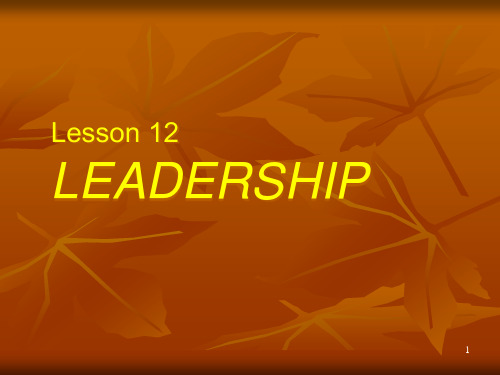
Leading is the process of creating vision, inspiring commitment and directing humanresource efforts toward organisational objectives (Schmerhorn).
Key Words: Influencing; Organisational Objectives; Vision; Inspiration; Commitment
3
WHY STUDY LEADERSHIP?
Employees believe that organisational successes and failures are linked to leadership. (Robbins)
Based on the assumption that certain physical, social, and personal characteristics are inherent in leaders;
Argues that presence or absence of these characteristics distinguishes leaders from nonleaders.
Corp)
cont…
5
Quotes on Leadership
In any case, leadership is finally a collaborative endeavour. (Warren Bennis, author and leadership scholar)
Leadership领导力演示课件
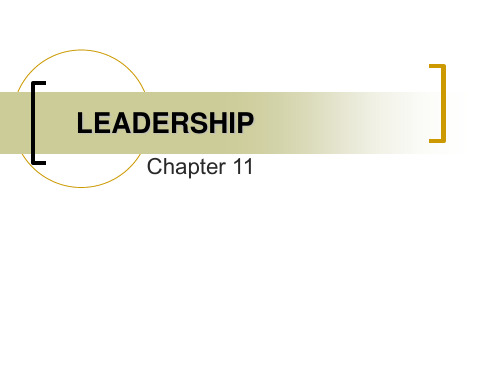
Who Will Lead? (cont)
➢ Demographic background of leaders
▪ Height, weight, & age ▪ Ethnicity ▪ Sex: Bias against women (even thought women
possess more skills needed to be a successful leader).
What is Leadership ?
“The process of influencing the activities of an organized group in its efforts toward goal setting and goal achievement” (Stogdill, 1950, p. 3)
▪ Trait Model: The great leader theory ▪ Situational Model ▪ Interactional Model: depends on the leader,
followers, and the Great Man Theory
only the great people possessed them
The Great Man Theory
➢ Personal qualities of leaders
▪ Personality traits, such as extraversion, conscientiousness, and openness.
➢ Practically
▪ productively, economically, idealistically
➢ Personally
管理者的领导力框架 英文课件

9,1 9
1
2
3
4
5
6
7
8
Concern for Production
5,5 Middle-of-the-Road Management
Adequate organisation performance is possible through balancing the necessity to get out work with maintaining morale of people at a satisfactory level
Manager defines limits, asks group to make decision
Manager permits subordinates to function within limits defined by superior
JOINS
Manager allows employees complete freedom of action
SELLS
.
Adapted from Hannagan (2005)
A framework for the study of managerial leadership
Servant Leadership
Servant Leadership was first described by Robert Greenleaf in his book, Servant Leadership – (Greenleaf, 1977). Servant leaders transcend self-interest to serve the needs of others, help others grow and develop and provide opportunities for others to gain materially and emotionally.
领导力(英文)

3.The managerial grid
Blake & Mouton
• A 9-by-9 matrix outlining 81 different styles • concern for people, production • 9 possible positions along each axis • managers perform best under a 9,9 style;
1.(2)Cognitive resource theory
update in 1987
• A theory of leadership stating that a leader obtains effective group performance by,1st, making effective plans,decisions,& strategies;2nd, communicating them through directive behavior
• “false starts” based on their erroneous conception
• Contingency models to explain the inadequacies of previous leadership
• attempting to identify the set of traits that people implicitly refer to as a leader
Lesson_12_Leadership_领导力
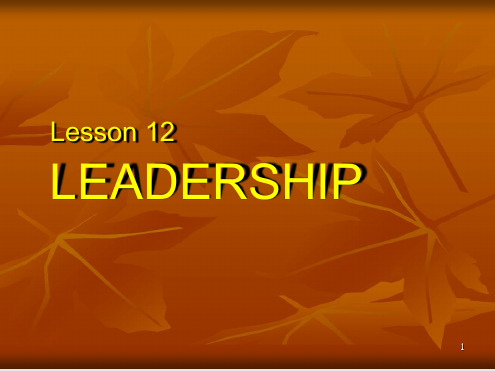
LEADERSHIP
1
Overview
? Introduction: What is leadership? Why study leadership?
? Historical Developments of Leadership
Approaches
? Traits Approaches
? Leadership is the ability to influence a group toward the achievement of goals (Robbins).
? Leading is the process of creating vision, inspiring commitment and directing humanresource efforts toward organisational objectives (Schmerhorn).
Corp)
cont…
5
Quotes on Leadership
? In any case, leadership is finally a collaborative endeavour. (Warren Bennis, author and leadership scholar)
? To lead the people, walk behind them…As for the best leaders, the people do not notice their existence. The next best, the people honour and praise. The next, people fear; and the next the people hate…When the best leader's work is done, the people say, “ We did it ourselves!”
中英文对照领导力课程ppt
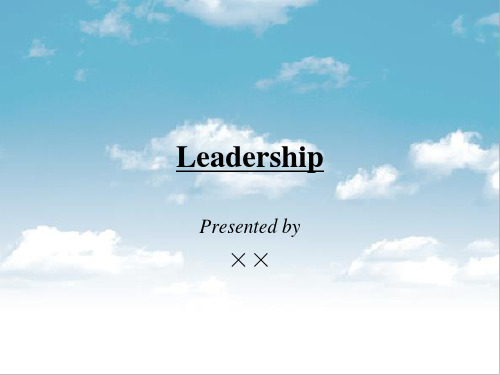
管理者风格的影响因素
基层管理人员
Roland Smith
Writers on Managers
“Managers convert effort into performance & a rabble into an organisation”
Peter Drucker
“Managers are the grit in the oyster”
individual
John Adair
以行动为中心的领导力
完成任务
建设与保持团队 发展个人
约翰·阿代尔(John Adair)
Leadership Continuum
Boss-centred leadership
Use of authority by the manager
Subordinate-centred leadership
throughout the organisation
• Respond to the needs of employees through support, encouragement or direction
• Sense of direction
• Initiate action
一个组织内领导者的职能
function
领导者特征
• 创造理想未来状态的愿景 • 影响他人的能力 • 他人认可这种能力 • 目标导向型 • 领导者具有重要象征性意义
Leader or Manager?
• Leaders create a vision of the future: managers are concerned about the here and now of goal attainment.
领导讲义英文(ppt 23页)

1.Ohio State studies
in the late 1940s
• Identify independent dimensions of leader behavior. beginning with over 1000 dimensions
• management coping with complexity,leader coping with change,developing a vision of the future; most firms are underled & overmanaged
Transition in ห้องสมุดไป่ตู้eadership theories
What makes an effective leader
• the 1st approach sought to find universal personality traits that leaders had to some great degree than nonleaders
• explain leadership in terms of the behavior a person engaged in
• Identify traits consistently associated with leader: ambition & energy,the desire to lead,honesty & integrity, self-confidence, intelligence,job-related knowledge
• “false starts” based on their erroneous conception
领导力介绍(英文)PPT课件
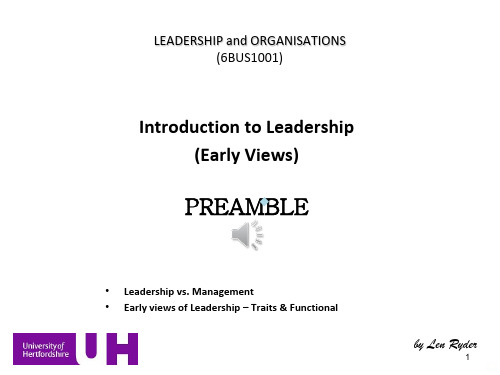
Introduction to Leadership (Early Views)
PREAMBLE
• Leadership vs. Management • Early views of Leadership – Traits & Functional
9
Leadership and Organisations
The Key Concepts…
Management
5
Leadership and Organisations
Why do we study Leadership?
The research demonstrates that organisations with the highest quality leaders were much more likely to outperform their competition in key bottom line metrics, such as: •Financial performance •Quality of products and services •Employee engagement •Customer satisfaction.
Some organisations
Succeed at energizing their employees
Enhance profitability, survival and growth
Others
Fail to tap the potential of their people
and this in turn leads on to Enhanced business impact (such as financial gains and customer satisfaction).
领导力介绍ppt

LEADERSHIP PRESENTATION
4
5 Factors Leadership
01
02
03
04
05
LOREM IPSUM
LOREM IPSUM
LOREM IPSUM
LOREM IPSUM
LOREM IPSUM
Lorem ipsum dolor sit amet, consectetur
adipiscing elit. Donec euismod volutpat sem, non
feugiat nunc eleifend finibus. In sed consectetur enim. Morbi ornare ipsum
ornare posuere finibus.
Lorem ipsum dolor sit amet, consectetur
adipiscing elit. Donec euismod volutpat sem, non
02
Lorem ipsum dolor sit amet, consectetur adipiscing elit, sed do eiusmod tempor incididunt ut labore et dolore magna aliqua.
03
Lorem ipsum dolor sit amet, consectetur adipiscing elit, sed do eiusmod tempor incididunt ut labore et dolore magna aliqua.
feugiat nunc eleifend finibus. In sed consectetur enim. Morbi ornare ipsum
《Leadership_introduction_lecture领导力》(英文版)
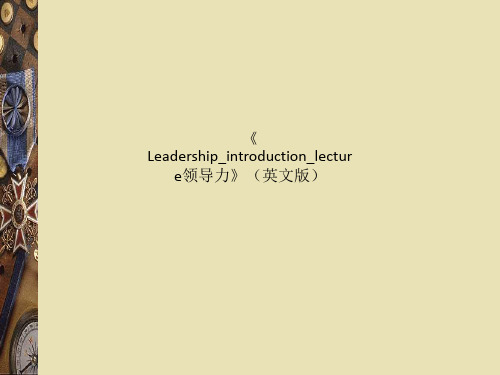
Leadership_introduction_lectur e领导力》(英文版)
Activities
Film Review & Applications (Individual) Gandhi Brave heart Patch Adams
In-Class Films Daniel Goleman Ron Kauffman Fish Principle Ninoy Aquino
Think of three leaders whom you will follow only if you are forced to do so or if you are paid with lots of money or who you will not follow at all no matter what. Why won’t you follow them voluntarily? What are their traits?What do they do? What is their impact on you?
32
C o u rag e o u s
29
27
C o o p e ra tiv e
28
25
I m a g in a tiv e
28
34
C a rin g
23
26
D e te rm in e d
17
20
M a tu re
13
23
A m b itio u s
13
21
L o yal
11
11
S e lf - C o n tr o lle d
S e le c tin g
1 9 8 7 R e sp o n d e n ts: P e r c e n ta g e o f P e o p le
CARGILL领导力模型简介(ppt 48页)

as leaders, we have to be ready to make choices, even when they are difficult or in situations that are uncertain. 作为领导,必须随时准备好做抉择,包括困难的和不确定情况下的抉择。ie
2002: The heart of leadership was added 加入领导力核心(to emphasize
integrity/conviction/courage)
CARGILL领导力模型- 组成部分
领导力的核心 Heart of Leadership
每位领导人不可或缺的特质
Non-negotiable
‧ -对人诚实与真挚 ‧ -言出必行 ‧ -值得信赖
正直诚信建立在你所持有的个人价值观与信念的基础之 上。
它支持Cargill所定义的价值观,对高效领导力的发挥至关 重要。
信念 Conviction
信念是引发行动的坚定信仰或念头。它展现如下:
‧ 将信念转化成行动 ‧ 用信念激发他人的行动
领导力由信念所激发。如果领导者有着对更好未来的 憧憬,他们就会有实现它的强烈欲望。
- To understand了解为什么重要:“Why” - To understand:理解领导力模型“ what”
build common understanding of leadership model (heart/4 capabilities)
- Learn to apply 学以致用“ How”
Knowledge
Behaviors
PMP
主要工作成果 Key Results Area
LEADERSHIP 领导力

– To involve the group in decision making – To let group determine work methods – To make overall goals known – To use feedback as an opportunity for helpful coaching
Different
In China : leaders focus on building their image and authority .
In west: Directive,
Participative
Empowering Charismatic Celebrity.
• First, determining what kind of leaders you want to be • Second, finding out the traits featuring your aspired types of leaders • Cultivating yourself by foster charisma, exerting determination in decision-making; being openminded and forward-looking; learning from great leaders
FORETHOUGHT
STAY HUNGRY, STAY FOOLISH.
谨以此片献给那些用强大领导力改变世界的人们 让我们向那些疯狂、特立独行、想法与众不同的家伙们致敬
本PPT仅供个人学习研究使用Leabharlann LEADERSHIP IS
Leadership 领导力(2)
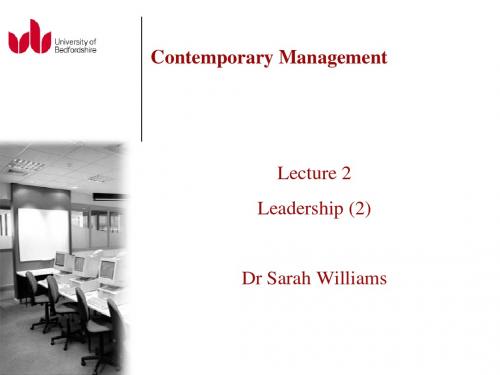
• Global economy, marked by freed trade, free flow of capital & cheaper foreign labour markets • Sophisticated communications and transportation technologies and services • Mass migrations • Level of economic activity outgrown national markets • International agreements reducing the cost of doing business
– Predatory pricing and employee lawsuits Reference: /office/entrepreneurs/articles/115557.asp x
What makes a business a business?
5. Risk Aversion Pberg (Just Business: Business Ethics in Action, 2000)
Ethical Dilemmas
Ethics: Principles of right and wrong
that individuals, acting as free moral agents, use to make choices to guide their behaviors
1. Golden Rule
• Do unto others as you would have them do unto you
Leadership领导力24372PPT课件
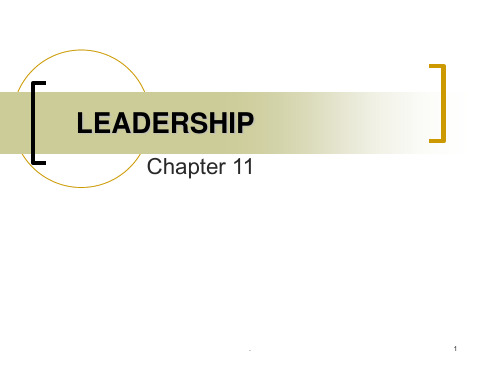
.
5
Leadership myths (cont.)
➢ Leaders make or break their groups
The “romance of leadership” exaggerates the impact of a leader
Leaders do make a difference (e.g., sports teams)
▪ Reciprocal ▪ Transactional ▪ Transformational ▪ Cooperative ▪ ?
➢ Leadership is power (with people rather than over people)
achievement
.
3
What is Leadership?
➢ Leadership: guidance of others in their pursuits, often by organizing, directing, coordinating, supporting, and motivating their efforts.
only the great people possessed them
.
8
The Great Man Theory
➢ Personal qualities of leaders
▪ Personality traits, such as extraversion, conscientiousness, and openness.
followers, and the group situation.
.
7
The Great Man Theory
关于领导力的讲座英文
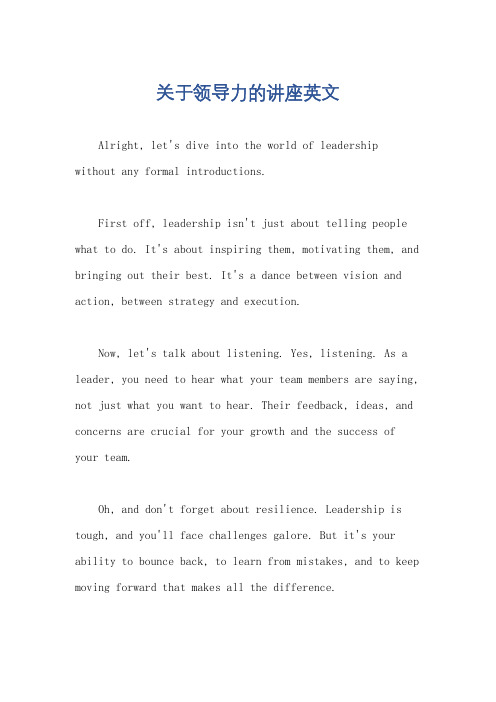
关于领导力的讲座英文Alright, let's dive into the world of leadership without any formal introductions.First off, leadership isn't just about telling people what to do. It's about inspiring them, motivating them, and bringing out their best. It's a dance between vision and action, between strategy and execution.Now, let's talk about listening. Yes, listening. As a leader, you need to hear what your team members are saying, not just what you want to hear. Their feedback, ideas, and concerns are crucial for your growth and the success of your team.Oh, and don't forget about resilience. Leadership is tough, and you'll face challenges galore. But it's your ability to bounce back, to learn from mistakes, and to keep moving forward that makes all the difference.And speaking of differences, leadership means embracing diversity. Your team is a rainbow of skills, experiences, and backgrounds. Empowering each individual to contribute their unique color is the key to creating a vibrant and innovative workplace.Lastly, remember to have fun! Leadership can be intense, but it's also rewarding. Enjoy the journey, celebrate the wins, and make it an experience worth cherishing. After all, leadership is not just a role; it's a way of life.。
欧美风领导力培训PPT模板

添加标题
单击此处输入你的正文,文字是 您思想的提炼,为了终究演示
添加标题
单击此处输入你的正文,文字是 您思想的提炼,为了终究演示
添加标题
单击此处输入你的正文,文字是 您思想的提炼,为了终究演示
LOGO H ERE
Part Three
提高领导力
单击此处输入你的正文,文字是您思想的提炼,为了终究演示发布的良 好成效,请尽量言简意赅的论述观点;根据需要可酌情增减文字,以便 观者可以准确知道您所转达的信息。
LOGO H ERE
领导力培训
A wonderful serenity has taken possession of my entire soul, like these sweet mornings of spring which I enjoy with my whole heart.
XXX
日期:20XX 年1月1日
$324,512
$512,500
$844,200
$767,000
Product 4 Product 3 Product 2 Product 1
$0
$100,000 $200,000 $300,000 $400,000 $500,000 $600,000 $700,000 $800,000 $900,000
单击添加标题
单击此处输入你的正文, 文字是您思想的提炼,为 了终究演示发布的良好成 效,请尽量言简意赅的
输入您的标题 Review of work content
70%
30%
添加标题
单击此处输入你的正文, 文字是您思想的提炼,为 了终究演示发布的良好成 效,请尽量言简意赅的
添加标题
单击此处输入你的正文, 文字是您思想的提炼,为 了终究演示发布的良好成 效,请尽量言简意赅的
leadership领导力PPT
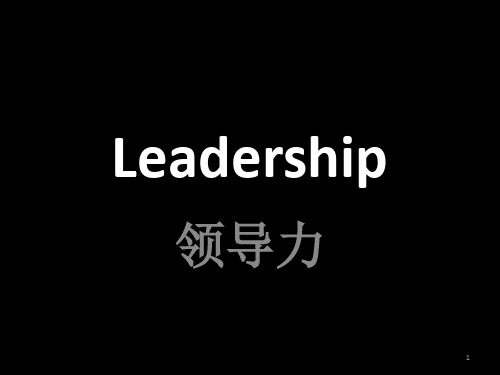
According to different situations, leader can choose suitable style by answer my following questions.
34
五种领导风格
1. Autocratic 1(A1) (独裁型) – you use the information you already have and make the decision
中心思想: 领导的职能是平衡个人,团队和任务。
This approach, "Action-Centred Leadership", is centred on the actions of the leader. The leader has to balance the needs from each of the three elements. The effective leader is the one who keeps all three in balance; that is who attends to all three at the same time. If any one element is ignored, the others are unlikely to succeed.
五选一
7
1.Tannenbaum and Schmidt continuum 经理-非经理人员行为模式连续分部场
中心思想: Manager’s authority VS subordinate’s freedom 经理人的权利 VS 下属的自由度
8
Tannenbaum and Schmidt continuum
Lesson Leadership 领导力
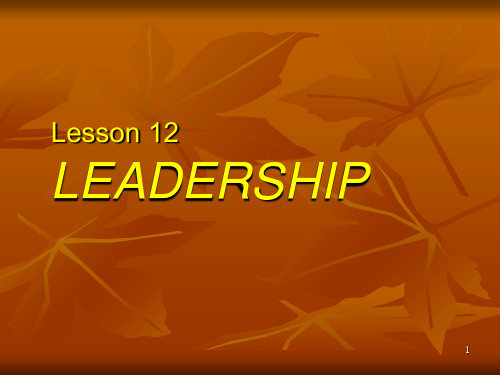
4
Quotes on Leadership
Leaders, in special way, are liable for what happens in the future, rather than what is happening day-to-day.
reliability and validity of tests
11
BEHAVIOURAL APPROACHES
Focuses on differences in actions of effective and ineffective leaders;
Based on how they delegate tasks to subordinates; where and when they communicate to others; and how they perform their roles;
Leadership is the ability to influence a group toward the achievement of goals (Robbins).
Leading is the process of creating vision, inspiring commitment and directing humanresource efforts toward organisational objectives (Schmerhorn).
coaching
15
Laissez-faire
Leader lets group members make all decisions Give the group complete freedom Provide necessary materials Participate only to answer questions Avoid giving feedbacks E.g. writers, painters, expert-specialist workers
- 1、下载文档前请自行甄别文档内容的完整性,平台不提供额外的编辑、内容补充、找答案等附加服务。
- 2、"仅部分预览"的文档,不可在线预览部分如存在完整性等问题,可反馈申请退款(可完整预览的文档不适用该条件!)。
- 3、如文档侵犯您的权益,请联系客服反馈,我们会尽快为您处理(人工客服工作时间:9:00-18:30)。
Source: Adapted from O’Reilly & Pfeffer (2000) Hidden Value - How Great Companies Achieve Extraordinary Results from Ordinary People, Boston: Harvard Business School Press
LEADERSHIP and ORGANISATIONS
(6BUS1001)
Introduction to Leadership
(Early Views)
Len Ryder
Leadership and Organisations
Introduction to Leadership
What is Leadership?
Leadership and Organisations
Why do we study Leadership?
High quality leadership leads to Enhanced people outcomes (such as improved retention and engagement) and this in turn leads on to Enhanced business impact (such as financial gains and customer satisfaction).
Leadership and Organisations
Why do we study Leadership?
The research demonstrates that organisations with the highest quality leaders were much more likely to outperform their competition in key bottom line metrics, such as: • Financial performance • Quality of products and services • Employee engagement • Customer satisfaction.
whereas
Managers get things done by controlling people & by appealing to their rational thinking.
Leadership and Organisations
Leadership vs. Management
Leadership and Organisations
Defining Leadership – Early Views
Leadership and Organisations
Leadership vs. Management …..However, managers must have leadership qualities if they are to be effective. Management is more about
Leadership and Organisations
Defining Leadership – Early Views
1. The Qualities or Traits Approach
Leadership was conceptualised as a single “Great Man” who put everything together and influenced others to follow.
Daft, Richard L. (2008)The Leadership Experience.
According to Carlyle, effective leaders are those gifted with divine inspiration and the right characteristics. "The history of the world is but the biography of great men."
Drucker P.F.(1989) The Practice of Management
Leaders were identified as having certain inherited qualities or traits such as Self-confidence; Initiative; Intelligence; Self-belief.
An effective leader does not need to be a manager but a manager must have leadership qualities in order to be effective!
y basis and ensuring consistency”
getting things done on a day-to-day basis and ensuring consistency”
Leadership and Organisations
Leadership vs. Management
Point to ponder…….. Management is more about getting
“State of Leadership Today”
Leadership and Organisations
The Key Concepts…
‘Leadership’ comes from words of Anglo Saxon and Nordic origin meaning ‘route’, ‘path’ and ‘journey’, so leadership is about ‘direction’ and ‘movement’ ‘Management’ comes from the Latin word ‘manus’ which means ‘hand’, so management is about being ‘hands-on’.
Leadership and Organisations
The Key Concepts…
Management
Takes place within a structured organisational setting and with prescribed roles Is directed towards the attainment of aims and objectives Is achieved through the efforts of other people Uses systems and procedures
Some organisations
Others
Succeed at energizing their employees Enhance profitability, survival and growth
Fail to tap the potential of their people
To the detriment of the organisation’s longterm financial performance
“Leaders are people who do the right thing;
Managers are people who do things right”
Bennis W. and Nanus B. (1985) Leaders: Strategies for Taking Charge
Leadership and anisations
Opening Premise
Leading & managing people is difficult. Why? Humans are wilful and unpredictable They have different interests and objectives Organisations face constantly changing circumstances
whilst Management could be seen as planning, organising, directing and
controlling. (Henri Fayol in Mullins, 2010 p429) Management is more about getting things done on a day-to-day basis and ensuring consistency”
Leadership and Organisations
The Key Concepts…
Leadership
Is about getting others to follow - or getting others to do things willingly Is about a relationship through which one person influences the behaviour or actions of others Does not necessarily take place within a structured environment Importantly, many people act as leaders without being given a prescribed role
(Mullins, 2010: p425)
Leadership and Organisations
Leadership vs. Management
